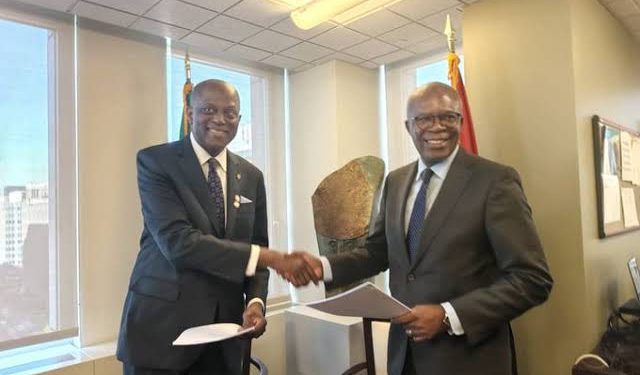The Central Bank of Nigeria (CBN) and the Bank of Angola have formalised a new partnership through the signing of a Memorandum of Understanding (MoU), aimed at strengthening collaboration across critical areas of central banking and enhancing regional financial stability in Africa.
The agreement, signed during the Annual Meetings of the International Monetary Fund and World Bank Group in Washington, D.C., was endorsed by CBN Governor Olayemi Cardoso and his Angolan counterpart, Manuel Antonio Tiago Dias. It covers a wide scope of cooperation, including exchange control, financial market management, currency operations, reserve management, and economic research.
Both central banks will also collaborate on monetary and financial statistics, payment systems, banking regulation, cybersecurity, financial sector development, and anti-money laundering and counter-financing of terrorism (AML/CFT). The deal extends to staff training and technical assistance, establishing a structured framework for shared expertise and regulatory coordination.
Cardoso described the agreement as a significant milestone in promoting regional integration and addressing Africa’s interconnected economic challenges. He noted that the partnership aligns with the CBN’s strategic priorities of fostering cross-border financial integration and strengthening institutional resilience across the continent.
“This agreement gives us the opportunity to strengthen regional understanding, share experiences, and build a more interconnected and robust financial system,” he said.
CBN Deputy Governor for Economic Policy, Dr Muhammad Sani Abdullahi, emphasised that the MoU will enhance transparency, information exchange, and joint supervision of financial institutions with cross-border operations. He highlighted that both central banks aim to improve their capacity to manage systemic risks while advancing innovation in central banking practices.
Governor Manuel Tiago Dias of the Bank of Angola said the collaboration reflects a broader commitment to deepening African financial cooperation, promoting macroeconomic stability, and improving payment systems across the continent. He noted that Nigeria and Angola share common goals in building resilient financial systems capable of withstanding global economic pressures.
The partnership is expected to facilitate knowledge transfer, broaden financial inclusion initiatives, and contribute to efforts aimed at developing a stronger regional economic architecture in Africa.










